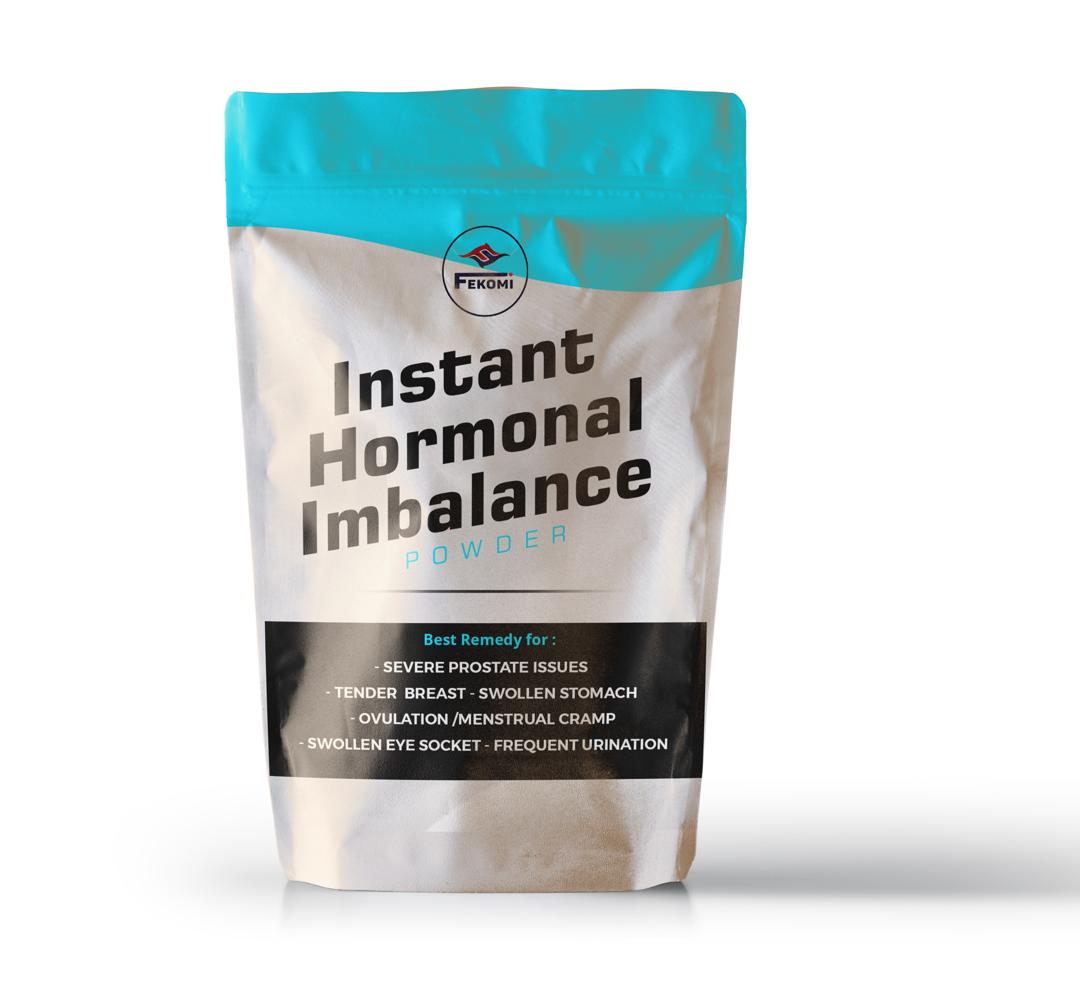Revolutionize your hormonal imbalance Now Now!
Hormones are like the messengers of the human body, They are produced in the Endocrine glands & travel to the different tissues/organs in our body, helping them to function properly.
Hormonal Imbalance occurs when there’s too much or too little of a particular hormone in the body.
While it is normal for hormone levels to shift throughout your lifetime, sometimes the Endocrine glands get things wrong & produce levels of hormones that can cause problems.

For more than five years, Mrs olawale Adedokun has been married without a child. She suffers from irregular menstruation. Often when she is in her period, it is with unbearable pain. It is so sharp to the extent that she sometimes needs drugs for relief. Recently, her last menstruation landed her in the hospital.
She said,
“The pain was so unbearable that my husband rushed me to the hospital. I was asked some questions and the answer I gave made the doctor refer me to the laboratory for hormonal profiling. Before now, I had no idea what hormones were or what they do and that they can even affect my health. I learned that if one’s hormones are not balanced, it could lead to infertility.”
The body produces hormones to serve as the body’s messengers to assist in the function and regulating your metabolism and whether or not you have mood swings; they are also in charge of regulating breathing, sleep, movement, reproduction, stress, growth, etc. There are many hormones in the body, but let’s focus on the female sex hormones, estrogen, progesterone, and testosterone. To better understand hormonal imbalance, let’s first look at the general function of these sex hormones.
Estrogen stimulates the growth of the tissue, such as the development of breast and reproductive organs, and ensures their function. In the brain, it boosts the synthesis and function of neurotransmitters that affect sleep, mood, memory, libido, and cognitive factors such as learning and attention span.
Testosterone is manufactured in women by ovaries and adrenal glands and enhances libido and sexual response. It strengthens ligaments, builds muscle and bone, assists brain function, and is also associated with assertive behaviors and a sense of well-being. Though testosterone does not play a role in the balance of sex hormones, the main culprits when it comes to imbalance are progesterone.
Hormones play a very important role in the life of a woman; virtually everything is blamed on hormones, from loss of hair to bad skin to changes in voice. They are an important chemical messenger that affects many aspects of our overall health.
Hormones are like musical instruments in an orchestra. Each plays its part in creating a perfect concert until the day one is out of tune and throws off the entire melody.” Says Komiyo Lawrence MD/CEO Fekomi herbals. The work hormones may seem subtle and little, but when it falls out of balance, the effects they could create may impact negatively how a woman’s reproductive system functions.
A hormonal imbalance is an incorrect quantity of one or more hormones in the bloodstream. The timing of the hormone(s) release, interactions with other hormones, and ability to respond through cell receptors are also important for hormonal balance.
An irregular balance of the hormones associated with reproductive health in one or both partners can make conception and pregnancy difficult. Hormonal imbalances are the leading cause of infertility in women but are often treatable with lifestyle changes and medications.
It helps to understand how hormones affect fertility. Your hormones play a pivotal role in your reproduction, particularly those hormones that control your menstrual cycle. For a pregnancy to occur, hormones in your body must signal and regulate the growth of an egg within your ovaries, the release of the newly formed egg into the fallopian tube, and the thickening of the uterine lining for implantation. If the newly released egg is fertilized by sperm, the resulting embryo will then travel to the uterus for implantation.
The development of sperm is also regulated by hormones within the male body. If one or more hormones are absent or irregular in quantity, it can delay or prevent any of these processes from occurring, making pregnancy difficult to achieve.
For you as a woman, we pointed out that some of the most commonly diagnosed conditions and hormonal imbalances that could lead to hormonal imbalance are anovulation, polycystic ovary syndrome (PCOS), and hyperprolactinemia.
These conditions often result in infrequent or absent ovulation, which complicates an individual’s or couple’s ability to become pregnant.
Oftentimes, hormonal imbalance is not diagnosed until you experience infertility. You may experience symptoms ranging from absent or irregular periods, spotting between periods, heavy or painful periods, and unexplained weight gain among others.
A man is less likely to have a hormonal imbalance that contributes to infertility than a woman, but men may experience symptoms such as erectile dysfunction, low sperm count, reduced body hair growth, thinning hair, or male pattern hair loss. If you manifest any of these symptoms, it’s important to discuss with a reproductive endocrinologist if infertility is suspected.
Did you know that the hormones surging through your body influence or even control many of the most important bodily processes—including the ability to get pregnant? This is what happens and because you can’t see or consciously adjust the levels of these critical compounds, it can be profoundly frustrating when you find yourself struggling to conceive if you suspect that a hormone irregularity may be at play.
This may be stressful and upsetting, but it’s important to remember that one in four Nigerian couples of reproductive age will experience difficulty conceiving. In many of these cases, hormonal imbalances are part of the problem.
Hormones are varied, invisible, and interactive. So getting a firm grasp on a hormonal imbalance and its potential impact on fertility can be challenging, if not downright frustrating, so along the journey towards conception, knowing how your hormones impact your fertility and, what you can do to minimize or eliminate issues, is a wise step.
The number of different hormones that impact your fertility is one of the things that can make addressing hormone-related infertility particularly challenging. The good news is that in many cases, taking the right measures will balance the hormones, which will ultimately lead to easier conception.
Treating hormonal imbalance treatment with herbal Medicine?
The answer to the above question is YES! There are potential herbal products that work for the treatment of hormonal imbalances. However, you should ensure to verify the products before consuming them.
You might wish to book an appointment with a certified health consultant at Fekomi Wellness today and being your treatment journey with Fekomi Herbals.

Our hormonal imbalance (NAFDAC Registered) contains herbs that are well-formulated to improve your hormone balance. With lots of positive feedback from our various clients across the globe, you can be optimistic that our products, which are NAFDAC CERTIFIED, will you the maximum desired result. Click to order your Instant Hormonal Imbalance Powder here
For further inquiries, kindly call our desk line on 09074197154 or visit our website, fekomiharbals.com
You can also follow our social media page on Instagram @fekomi, and Twitter @fekomiherbals.

Pingback: Sperm Cramp - Fekomi Herbals